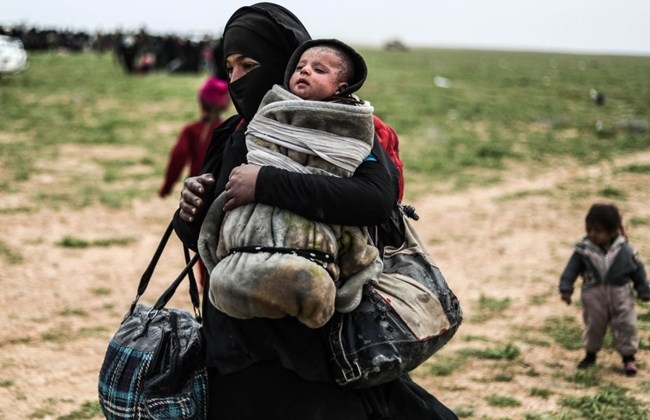Netanyahu vows to prevent Iran securing lasting Syria presence
Israel’s prime minister vowed to prevent Iran from securing a lasting presence in Syria as he visited Moscow Wednesday for talks focusing on regional security. For Benjamin Netanyahu, it’s the first trip to Moscow since September’s downing of a Russian warplane by Syrian forces that were responding to an Israeli airstrike.
The incident left 15 Russian crew dead and threatened to derail security ties between the two countries.
Russian President Vladimir Putin said at the start of Wednesday’s talks that “it’s very important to discuss the situation in the region and security issues.”
He added that the high-level consultations were essential in view of the evolving situation.
Netanyahu began the talks by reaffirming Israel’s strong determination to block attempts by Iran to establish a foothold in Syria.
“The greatest threat to stability and security in the region comes from Iran and its satellites,” he said.
“We are determined to continue with our aggressive action against the efforts of Iran, which calls for our destruction, and against its attempts to entrench militarily in Syria.”
Moscow has played a delicate diplomatic game of maintaining friendly ties with both Israel and Iran. Last summer, Moscow struck a deal with Tehran to keep its fighters away from the Golan Heights to accommodate Israeli concerns about the Iranian presence in Syria.
Netanyahu noted that he and Putin have held 11 meetings since September 2015 and hailed “the direct, open and true way in which we maintain the relationship between Russia and Israel.”
“The direct connection between us has been an essential element that has prevented risks and conflicts between our militaries, and that has contributed to regional security and stability,” the Israeli leader said.
Separately, Russia and Syria issued a joint statement calling on U.S. forces to leave Syria and to allow people inside the Rukban refugee camp in the southeast of the country to be evacuated by Russian and Syrian forces.
The statement, released by Russia’s Defense Ministry, said Russian and Syrian forces had prepared buses to relocate refugees at the camp in the Rukban area and would guarantee them safe passage so they could start new lives.
“We also call on the United States, whose military units are on Syrian territory illegally, to leave the country,” the joint statement read.
The United States said earlier this month it would leave about 400 U.S. troops split between two different regions of Syria, a reversal by U.S. President Donald Trump that could pave the way for U.S. allies to keep troops in Syria.
Meanwhile, the U.S.-backed Syrian Democratic Forces in eastern Syria scrambled Wednesday to extract more families from the last dreg of the Daesh (ISIS) “caliphate” before delivering a final blow to the militants. Several thousand people – fighters and their relatives – are believed to be holed up in the last pocket of Daesh-controlled territory, barely half a square kilometer, near the Iraqi border.
The “caliphate” is only days away from dying in a tiny village few Syrians had ever heard of until recently. Thousands of its last denizens, many of them women and children, have been pouring out of the riverside hamlet of Baghouz in recent days, posing a huge humanitarian challenge for the Kurdish fighters leading the operation.
Survivors of the months-old siege spilling out of the double-trailer trucks that transported them out of Baghouz told harrowing tales of starvation and many of the evacuees required immediate medical attention. Lines of black-veiled women holding scruffy children and carrying their scant belongings in bags could be seen walking across the plain.
Save the Children said many of the surviving children had witnessed devastating events in recent months and were “showing signs of psychological distress.”
The men were carefully screened by the SDF, which has spearheaded the battle against Daesh in Syria, with support from a U.S.-led coalition. According to the Britain-based Syrian Observatory for Human Rights, about 10 percent of the estimated 50,000 people who fled the last militant bastions since December were Daesh members trying to slip back into civilian life.
The die-hard militants, among them many foreigners, still clinging to the last patch of the “caliphate” in Baghouz have also been using civilians as human shields.
Footage captured by the BBC from positions held by Iraqi paramilitary forces across the Euphrates River showed an improvised camp, where what appears to be a militant can be seen running among makeshift tents.
As warplanes fly overhead, a woman is seen collecting water from the river in plastic jerrican while black men move stealthily among the jumble of minivans and civilian shelters that make any direct airstrike impossible.
The SDF launched its final offensive against Daesh territorial control in September 2018.
The operation has been deadly and slow, with one top French officer even publishing stinging criticism of the coalition’s reluctance to fully involve its ground forces.
Source: Netanyahu vows to prevent Iran securing lasting Syria presence | News , Middle East | THE DAILY STAR

